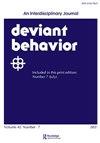是(网络)欺凌吗?使用混合方法评估成人对欺凌和网络欺凌的看法
IF 1.4
4区 社会学
Q2 CRIMINOLOGY & PENOLOGY
引用次数: 0
摘要
摘要尽管对欺凌的研究已经持续了几十年,对网络欺凌的研究也层出不穷,但这两个术语都没有一个统一的定义。这些术语的定义不明确可能会影响个人识别(网络)欺凌的能力。先前大多数关于欺凌和网络欺凌的研究都调查了在校儿童、他们的同龄人和老师的经历。然而,很少有研究调查普通公众是否能在学校环境之外识别欺凌和网络欺凌。因此,本研究的总体目标是调查成年人识别欺凌和网络欺凌的能力,并研究为什么受访者识别或不识别言语、身体和网络欺凌的基本原理。数据来自652名年龄在18岁到50岁之间居住在美国的成年人。结果表明,大多数受访者认为每种情况都是(网络)欺凌,然而,他们决定背后的理由各不相同。确定了七个主题(例如,重复、权力不平衡),作为参与者确定某种情况是一种欺凌形式的原因,以及他们不认为某种情况是一种欺凌形式的原因。为政策、实践和研究提供了启示。披露声明作者未报告潜在的利益冲突。伦理批准中佛罗里达大学提供机构审查委员会批准。中佛罗里达大学机构审查委员会确定该研究符合豁免标准。因此,向受访者提供了研究页面的解释,并放弃了书面同意。注1有些受访者选择不回答这个问题,有些人没有回答所提供的提示(即给出了无意义的回答)2 .许多回答被多个主题编码,因此,编码的总数高于回答的数量有关所选定义的更多信息,请参见附录A到C。其他信息资金数据收集由中佛罗里达大学刑事司法部门提供的内部资金支持。作者简介sara L. Bryson博士是东卡罗莱纳大学刑事司法和犯罪学系的助理教授。她的研究主要集中在青少年司法系统内的决策,青少年犯罪和欺凌受害者。她最近的研究发表在《青少年暴力与少年司法》、《人际暴力杂志》和《犯罪与司法杂志》上。Erica R. FisselErica R. Fissel博士是中佛罗里达大学刑事司法系的助理教授,与暴力侵害妇女研究集群有次要联系。她目前的主要研究兴趣集中在网络空间中发生的人际伤害,包括网络跟踪、亲密伴侣网络虐待和网络欺凌。她的研究探讨了受害和犯罪之间的关系,受害后的经历(例如,报告和寻求帮助的行为;受害者的后果),以及公众对基于网络的虐待形式的看法。本文章由计算机程序翻译,如有差异,请以英文原文为准。
Is It (Cyber)bullying? Assessing Adult Perceptions of Bullying and Cyberbullying Using a Mixed-Methods Approach
ABSTRACTDespite decades of research on bullying and the influx of studies examining cyberbullying, there is no universal definition for either term. The lack of clarity in defining these terms may impact individuals’ ability to identify (cyber)bullying. Most prior research on bullying and cyberbullying has surveyed school children, their peers, and teachers about their experiences. However, much less research has examined if members of the general public can identify bullying and cyberbullying outside of the school setting. Therefore, the overall objective of the current study is to investigate adults’ ability to identify bullying and cyberbullying and examine the rationale for why respondents identified – or not – instances of verbal, physical, and cyberbullying. Data were collected from 652 adults aged 18 to 50 years old who were residing in the United States. Results suggest that most respondents identified each scenario as (cyber)bullying, however, the rationale behind their decisions varied. Seven themes were identified (e.g. repetition, power imbalance) as both reasons participants identified a situation as a form of bullying, along with reasons why they did not believe a situation was a form of bullying. Implications for policy, practice, and research are provided. Disclosure statementNo potential conflict of interest was reported by the author(s).Ethics approvalThe University of Central Florida provided Institutional Review Board Approval.Consent to participateThe University of Central Florida Institutional Review Board determined the study met the criteria for Exemption. As such, respondents were provided with an Explanation of Research Page and written consent was waived.Notes1 Some respondents chose not to answer this question and others did not answer the prompt provided (i.e., gave nonsensical responses).2 Many responses were coded with multiple themes, thus, the total number of codes were higher than the number of responses.3 See Appendices A through C for more information related to the selected definitions.Additional informationFundingData collection was supported by internal funding provided by the Department of Criminal Justice at the University of Central Florida.Notes on contributorsSara L. BrysonSara L. Bryson, PhD, is an assistant professor in the Department of Criminal Justice and Criminology at East Carolina University. Her research focuses on decision-making within the juvenile justice system, juvenile delinquency, and bullying victimization. Her most recent research appears in Youth Violence and Juvenile Justice, the Journal of Interpersonal Violence, and the Journal of Crime and Justice.Erica R. FisselErica R. Fissel, PhD is an Assistant Professor in the Department of Criminal Justice at the University of Central Florida, with a secondary affiliation with Violence Against Women Research Cluster. Her primary research interests currently focus on interpersonal victimization that occurs in cyberspace, including cyberstalking, intimate partner cyber abuse, and cyberbullying. Her research explores correlates of victimization and perpetration, post-victimization experiences (e.g., reporting and help-seeking behaviors; consequences of victims), and public perceptions of cyber-based forms of abuse.
求助全文
通过发布文献求助,成功后即可免费获取论文全文。
去求助
来源期刊

Deviant Behavior
Multiple-
CiteScore
3.70
自引率
6.20%
发文量
64
期刊介绍:
Deviant Behavior is the only journal that specifically and exclusively addresses social deviance. International and interdisciplinary in scope, it publishes refereed theoretical, descriptive, methodological, and applied papers. All aspects of deviant behavior are discussed, including crime, juvenile delinquency, alcohol abuse and narcotic addiction, sexual deviance, societal reaction to handicap and disfigurement, mental illness, and socially inappropriate behavior. In addition, Deviant Behavior frequently includes articles that address contemporary theoretical and conceptual controversies, allowing the specialist in deviance to stay informed of ongoing debates.
 求助内容:
求助内容: 应助结果提醒方式:
应助结果提醒方式:


